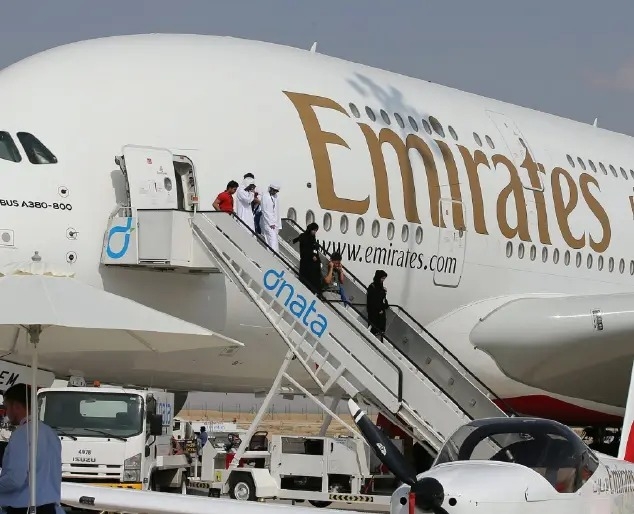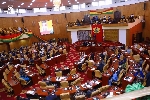Engineer appeals dismissed human rights case against Emirates Airline today
 Emirates Airline
Emirates Airline
The Court of Appeal will today hear a high-stakes appeal by Ghanaian businessman and Engineer Djanie Kotey against Emirates Airline.
The appeal, which could set a landmark precedent for airline accountability and human rights in Ghana, follows an initial High Court ruling in March that dismissed Kotey’s claims of mistreatment and document falsification by Emirates.
The original case, presided over by Justice Nicholas M. C. Abodakpi in Accra’s Human Rights Division, ended in favour of Emirates on March 22, 2024.
However, Kotey now seeks to overturn the ruling, alleging that the airline not only subjected him to inhumane treatment during his travels but also submitted falsified documents that misled the court.
Case Background and Allegations
Engineer Djanie Kotey’s case centres on alleged mistreatment during an Emirates flight in October 2018.
He was travelling from Accra to Dubai, Bangkok, and ultimately to Macau when he encountered issues with his visa, leading Macau authorities to deny him entry.
Kotey was sent back to Bangkok, where he claims Emirates representatives detained him in a cold, uncomfortable room at Suvarnabhumi Airport for days, despite holding a valid return ticket to Accra.
According to Kotey, he was forced to sleep on the floor and was denied medical assistance, causing his health to deteriorate.
He was later informed that he would need to purchase a new ticket on Kenya Airways for USD 600 if he wished to return home, even though he had already paid USD 99 to Emirates to change his original return date.
Document Discrepancies and Falsification Claims
Kotey’s appeal also hinges on alleged falsifications in the documents submitted by Emirates during the initial trial.
His legal team highlights multiple discrepancies, including:
Ticket Number: The ticket presented by Emirates as evidence displayed 16 digits, rather than the standard 15-digit Emirates format.
Additionally, the ticket name listed was “Angela Martha Prah,” not Engineer Djanie Kotey.
Ticket Price Difference: Emirates claimed that the ticket cost GH₵7,813.20, while Kotey’s actual ticket was priced at GH₵8,550.00, a notable difference that calls the authenticity of Emirates' documents into question.
Receipt Inaccuracy: While Kotey paid USD 99 to alter his return date, Emirates’ receipt showed a charge of USD 958.
Despite acknowledging Kotey's correct payment, the airline submitted the inaccurate receipt to the court, which, Kotey’s lawyers argue, misled the court in dismissing his case.
These discrepancies form a critical part of Kotey’s appeal, suggesting that Emirates may have misrepresented facts to gain a favourable ruling.
Human Rights Violations and Health Impacts
Kotey argues that his experience violated basic human rights, citing inhumane treatment and unwarranted refusal by Emirates to honour his return ticket.
Following his detention in Bangkok, Kotey’s health declined, with conditions such as pneumonia, abscesses, and chronic sleep disturbances requiring both medical and herbal treatments upon his return.
Implications of the Appeal
The Court of Appeal’s decision on this case could hold significant implications for airline conduct, passenger rights, and the legal standards surrounding corporate responsibility.
If Kotey’s appeal is successful, it may compel airlines to exercise greater transparency and accountability in handling passenger grievances and ensure that customer rights are upheld, even in international settings.
Human rights advocates, consumer protection agencies, and members of the aviation industry are closely monitoring the proceedings, anticipating a ruling that could shape future practices around passenger treatment and document authenticity in legal cases.
Conclusion
Today’s appeal hearing stands as a potential turning point in the pursuit of justice for Engineer Djanie Kotey. If the Court of Appeal finds in his favour, the case may establish a critical precedent for passenger rights and corporate accountability, especially in cases involving alleged mistreatment and document falsification.
Source: Classfmonline.com/Cecil Mensah
Trending News

Ghana’s education sector in funding crisis – Mahama
09:36
NHIA denies recruitment of staff ahead of transition
02:16
₵25m inadequate to facilitate release of 2024 WASSCE – WAEC
08:58
Parliament begins registration for for 2025 Legislature today
02:01
#2024 Polls: APC, MFC demand Jean Mensa’s resignation over election mismanagement
09:44
Ghanaians experiencing shifting voter behaviour -Independent MP-elect
01:40
CHASS demands immediate payment of outstanding funds to SHSs
09:44
Fire at Saglemi project contained by GNFS
01:13
Only NPP looting brigade not excited about ORAL – Ablakwa
07:26
Kofi Job Construction CEO donates to 1,000 widows and vulnerable individuals
00:51



